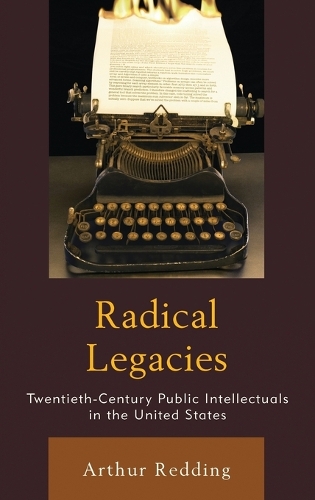
Radical Legacies: Twentieth-Century Public Intellectuals in the United States
(Hardback)
Available Formats
Publishing Details
Radical Legacies: Twentieth-Century Public Intellectuals in the United States
By (Author) Arthur Redding
Bloomsbury Publishing PLC
Lexington Books
24th December 2015
United States
Classifications
Professional and Scholarly
Non Fiction
History of the Americas
Anthologies
Essays
320.530973
Physical Properties
Hardback
170
Width 157mm, Height 239mm, Spine 17mm
372g
Description
What use is thinking This study addresses the ways in which modern American thinkers have intervened in the public sphere and attempted to mediate relations between social and political institutions and cultural and intellectual production. Chapters on both well-known (Henry Adams, Langston Hughes, C. Wright Mills, Angela Davis) and neglected (Randolph Bourne, Mary McCarthy, Paul Goodman) public intellectuals considers how these figures have address a range of problems, including the dangers and difficulty of critical dissent thought during wartime, the contemporary crisis of the humanities under neoliberalism, the legacy of American anti-intellectualism, academic professionalism, and the perils of consumer culture and popular tastes. This book reviews in as critically sympathetic a manner as possible a select few of the minor and major currents of twentieth-century American radical thinking in order to see where they might take us, and how they inflect our current social and intellectual predicaments. Arguing that any "use-value" theory of intellectual production is limiting, Radical Legacies endeavors to maintain and expand a space and reassert an argument for the importance of sustained critical reflection on our collective dilemmas today. It assesses a practice of thought that is engaged, committed, involved, and timely, without being necessarily practical or even useful.
Reviews
American literary historian Arthur Redding presents six essays on such radical American thinkers as Henry James, Henry Adams, Herman Melville, Langston Hughes, Emma Goldman, Paul Goodman, C. Wright Mills, and Angela Davis (Redding calls Davis 'one of the most compelling activist-philosophers alive'). These public intellectuals have raised deeply disturbing concerns about conservative tendencies in US culture and politics. Redding considers his subjects to be 'radical' in their formulation of hopeless Utopian causes such as prison abolition, pacifism, gender equity, racial equality, and economic justice. The word 'legacies' in the title alludes to the idea that the thinking of these writers is radical rather than reformist. They do not accommodate themselves to any of the conservative policies of the US government. Reddings aim is to keep alive some of this reflective resistance to, as he writes in chapter 1, US 'neo-imperial barbarism.' Redding reminds readers of the fact, so often ignored, that the US has achieved many progressive socialist goals, among them the eight-hour workday, the elimination of child labor, the extension of the vote to women and minorities, recognition of the right to collective bargaining, social security, public education, and Keynesian economics. Summing Up: Highly recommended. All readers. * CHOICE *
Author Bio
Arthur Redding is professor of English at York University in Toronto.
